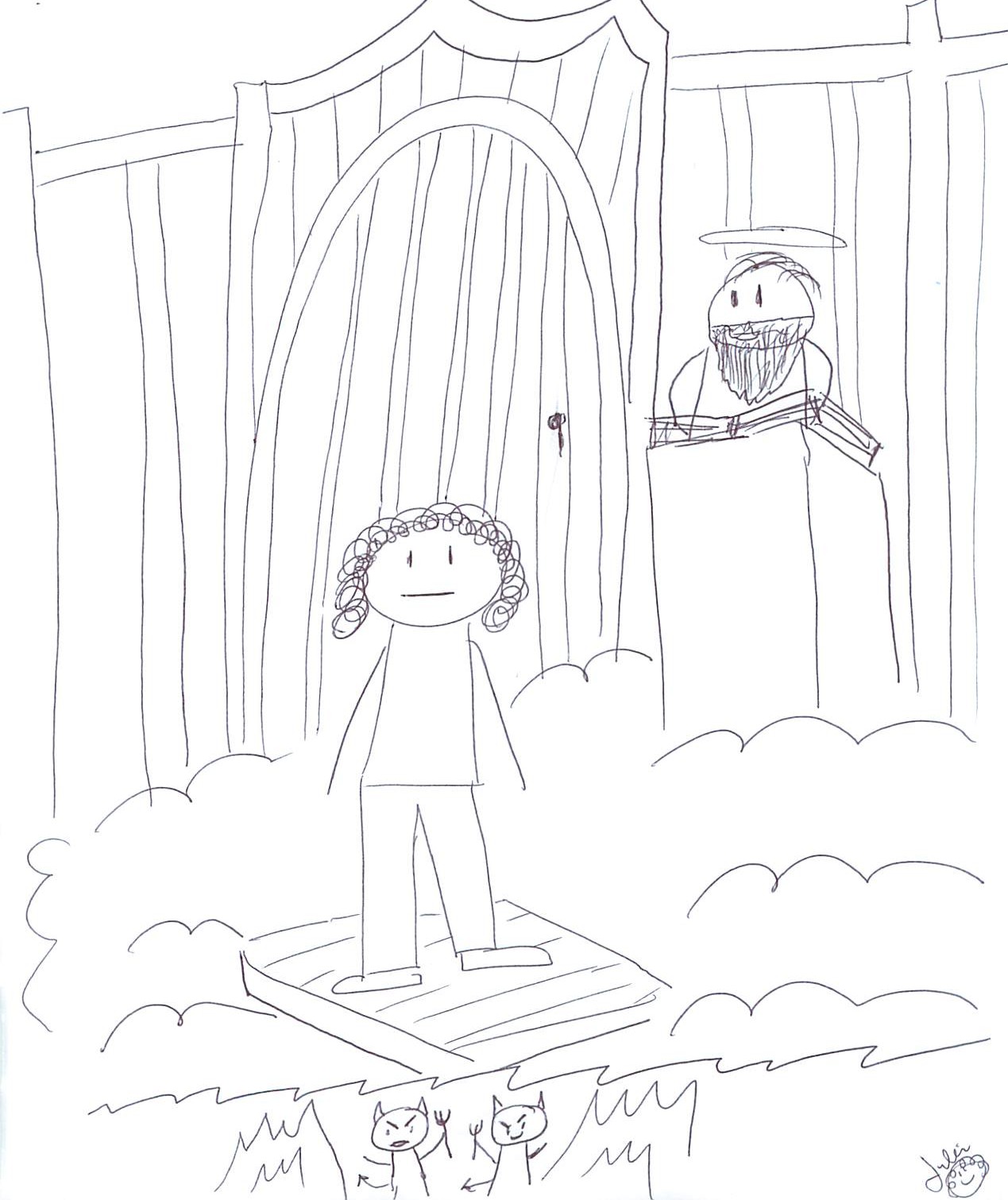Not to be a Pollyanna, but…
As a child, I absolutely loved the 1960’s Disney movie Pollyanna with Hayley Mills. There was something about the hope and joy that this little girl brought into the life of so many people that spoke to my heart.

It’s easily been 20 years since I’ve seen the movie, but one of the bits of dialogue that always stuck with me had to do with the message about “glad” and “sad” pieces of Scripture.
These days, to accuse someone of being “a Pollyanna” implies being naively optimistic. But I think she was on to something. And I think that an inordinate focus on the fire and brimstone messages of Scripture does damage to people’s faith. Whether I’m talking with an 83 year old woman on a retreat, a group of high school kids in a theology class, or a mom in her mid 30’s over a glass of wine, I find that people’s faith has been scarred by a fear of God and the threat of hell.
I’m not alone in rejecting the inordinate focus on fire and brimstone messages. But many have swung so far to the opposite side that they have thrown the baby out with the bathwater, so to say, rejecting either God or hell or both.
I suppose that’s why eschatology, the theological term for the “last four things” (death, judgment, heaven, and hell), is one of my favorite topics to teach about. A renewed understanding of heaven, hell, and judgment is so healing for so many people.
Imagery
Most people’s understanding of how heaven, hell, and judgment work is a cartoon-ized version of the following:
 Upon death, we imagine standing before the pearly gates. St. Peter looks at the big thick book on his podium. All of the good and all of the bad we have ever done is weighed on some cosmic scale; whichever way the scale tips determines our destiny. If the scale tips “good,” then the pearly gates open, choirs of angels sing, and we enter heaven. If the scale tips “bad,” then the trap door opens beneath our feet and we descend down to the fiery pits of hell.
Upon death, we imagine standing before the pearly gates. St. Peter looks at the big thick book on his podium. All of the good and all of the bad we have ever done is weighed on some cosmic scale; whichever way the scale tips determines our destiny. If the scale tips “good,” then the pearly gates open, choirs of angels sing, and we enter heaven. If the scale tips “bad,” then the trap door opens beneath our feet and we descend down to the fiery pits of hell.
That simplistic imagery might work for cartoon and comic artists, but it’s lousy theology and everyone knows it. So why is it so pervasive? From a religious education perspective, it engages our religious imagination, even if it’s unhealthy. So rather than just replacing that cartoon-ized imagery with the language of good theology, I’d like to offer some different imagery that opens us to healthier theology.
Upon the moment of your death, imagine you walk in to a IMAX theatre equipped with a great big sofa in the middle of the room. Who is sitting on this sofa? The Almighty and Ever-Loving God. You take a seat next to the Divine Presence, and God puts a Divine arm around your shoulder. The lights dim, and the instant the movie starts, you immediately recognize it as the story of your life. As it plays, you notice that for every good you have done, God squeezes your arm and lovingly whispers Thank you! For all the harmful or hurtful things you said or did… all times you should have done something but didn’t… you notice a tear roll down the Divine face. You realize that your thoughts, words, actions, and inactions have hurt God. You. Have. Hurt. God. Notice how that realization feels.
As the movie of your life continues, you also notice that any of those instances that you have expressed sincere remorse for–the ones you have sought forgiveness for in the Sacrament of Reconciliation–do not make it in to the movie, as if God does not feel the need to rehash it.
The movie ends, the lights come up, God turns to look at you and you realize you are now faced with a choice.
- You can look into God’s loving eyes, take responsibility, apologize, and seek forgiveness… to which God will reply, “Child, you are already forgiven. Welcome home!”
Or…

- You can refuse to accept the Truth of what you have made of your life. You can rationalize, making excuses and justifying your behavior. You can simply get up and walk out, choosing to believe your own version of events, indifferent to God. In effect, you can reject God and, in doing so, choose hell.
Heaven
God wants heaven for us. God wants us to choose heaven. Rather than thinking of heaven as some playground in the sky, think of heaven as being in the complete and total presence of God. United with God in heaven is the fulfillment of all longing, of our deepest desires. This is the beatific vision–seeing God’s face. This joy is paradise! A wedding feast! (See CCC, 1023-1029.)
But God is God. And Truth is Truth. And we must choose: God’s Truth or your own version of truth.
Hell
It is in rejecting God and God’s Truth that a person chooses hell. If heaven is being completely and fully in God’s presence, hell is complete isolation from God. (See CCC, 1033-1037.) We have no idea what complete isolation from God is like. Our lives are imbued with the presence of God. The grace of the Holy Spirit permeates our lives so much so that we don’t even have a concept of what complete isolation from God really means.
The images of heaven and hell in Scripture are intended to conjure relateable ideas, not provide a literal description. A fiery furnace… have you ever been badly burned? My sister has. She spent two weeks in the pediatric unit of the burn center of New Jersey when she was 10. Every day burn patients would need to spend time in the “tank room” where the raw skin in their wounds is scrubbed clean of debris so as to prevent infection; it’s more painful than most of us can imagine. A fiery furnace where clothing melts into skin… Isolation from God feels like that.
Purgatory
But what if you’re the sort of person who needs time to process the difficult Truths you faced. You want to take responsibility, you just need time to think and come to terms with things. This is where purgatory comes in. Purgatory is most emphatically not a punishment (see CCC, 1031), but rather Church tradition calls it a time of purification.
To use some traditional vocabulary terms: thus far, I have been describing what Church tradition refers to as “particular judgment,” or when each individual person is judged, they end up either heaven, hell or purgatory (CCC, 1022). Ultimately, there will come a time for all decisions to be made… the process of purification will need to be completed at some point; purgatory is not an eternal option. This is what we know as the “last judgment” and the Second Coming at the end of time (CCC 1038-1041). So we’ve got some time if we need it… just not forever.
But…
One of the things I always loved about teaching adolescents is their willingness to ask the difficult, uncomfortable questions that everyone is wondering.
This is the question that transitions the discussion from eschatology (heaven, hell, purgatory, and judgment) to morality, which will be discussed in another post. But it’s an important question that deserves an answer here.
Have you ever run a marathon? I have. All 26.2 miles. I never imagined I could do it. I never used to run. (I don’t actually run now, either.) But I did it with the help of my husband who mapped out the six months of daily training. From barely being able to run 2 miles without wanting to die, we trained and trained and trained. And in October 2003, I finished the Marine Corps Marathon alongside my then fiance, now husband.

The moral life is much like the training for the marathon of eschatology. Is it possible for someone who sits on the couch all day, every day eating cheetos to wake up the next morning and finish a marathon? Our faith calls us to say, Yes – it is possible. But not probable. I don’t know about you, but that “possibility” is not something I’m willing to rest my eternity on, either. Moral behavior is that training that helps us develop the quality of character who can–in the end–say yes to God.






